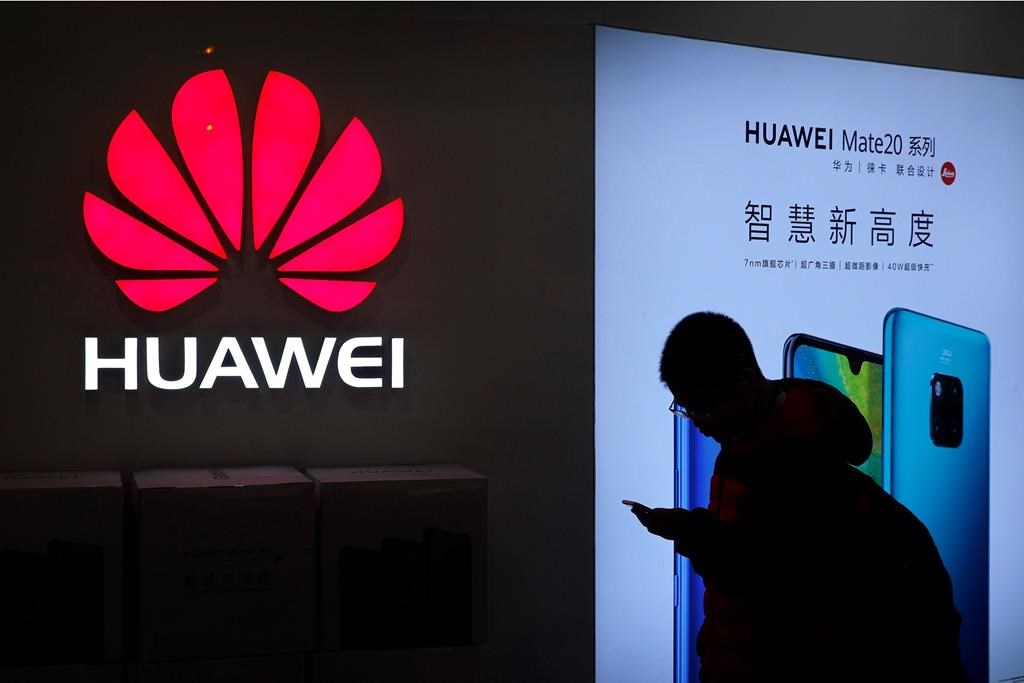A majority of Canadians want to see Huawei either barred entirely or limited in the role it can play in building the new 5G spectrum.

That’s according to a new poll done by the Angus Reid Institute which found 56 per cent of Canadians want the Chinese technology giant banned from any involvement in the next-generation network development. Thirty-four per cent want the firm involved in a limited role akin to a recent move by the U.K.
It comes as the federal government continues an ongoing assessment of whether the firm poses a spying risk, as American national security experts have long argued as the basis for the country’s own ban on Huawei and its efforts to get allies to block it from their markets as well.
Chinese companies are required by law to comply with requests from the Chinese government to spy for it, which has been a major point of the concerns raised.
READ MORE: Here are 5 ways to protect your privacy on smart devices
Some of those efforts to ban Huawei have been successful — Australia and New Zealand, both Five Eyes allies, have barred Huawei from their 5G networks.
But the U.K. last month rejected the demands from the U.S. to ban it outright and said it will allow the firm to play a limited role in non-core parts of the network.
The Globe and Mail also reported on Monday that the Canadian military wants the government to ban the firm, citing a threat to national security.
Global News has not independently confirmed that report.
In Canada, it’s not yet clear what position the federal government will take as it tries to calm unprecedented tensions with China over the detention of Huawei CFO Meng Wanzhou in 2018 on an extradition request from the U.S.
What is clear though is that despite the concerns raised about the firm, there continue to be proponents who want to use its technology.

Get daily National news
According to Scott Young, director of infrastructure research at Info-Tech Research Group, there are a couple of reasons why.
“There’s the fact that they tend to price themselves cheap,” said Young.
“As well, they’re able to offer extremely beneficial financing options to the telecommunications companies and that, arguably backed by the Chinese government, is giving them other benefits that can allow them to be in this position.”

What is 5G?
5G refers to the fifth generation of wireless internet access.
It’s the next upgrade to the networks that let things like your cellphone and laptop access the internet without having to be plugged in.
5G is poised to offer much faster speeds than what’s currently available and offer a more stable connection. As a result, it’s touted as vital to the future of the so-called Internet of Things.
But it also requires more antennas to cover service areas than does the existing network, and setting those up takes both time and money.
READ MORE: Innovation minister mum on whether Canada will mirror U.K. with partial Huawei 5G ban
The question of how best to balance cost and roll out time is part of why many telecom companies have advocated for being allowed to use Huawei.
They argue that because it is cheaper, the network can be rolled out faster than if they had to use more expensive competitors like Ericsson, Samsung or Nokia.
Young compared Huawei’s payment plans to someone offering to help to cut out the mortgage broker to buy a home.
“So it’s like going to buy a house from someone and that person saying, you don’t have to get a mortgage, you can pay me back at this discounted rate over time. I still get my money but you don’t have to deal with a mortgage broker who’s going to take their cut as well.”

The reason Huawei can offer those rates, he added, is because it’s backed up by the Chinese government.
And the resulting possibility for spying is not the only risk the government will need to balance.
“The problem with Huawei is it can’t fail,” said Stephanie Carvin, assistant professor of international relations at Carleton University’s Norman Paterson School of International Affairs.
“If it makes bad business decisions it’s not going to go out of business because the Chinese government is going to give unlimited loans so this is one of the challenges that we have. They can afford to be competitive because they don’t have to respond to the market. They are a market-distorting company.”
At the same time, banning them won’t necessary mean cyber security risks in the market are eliminated, she noted.
“The problem is if you basically ban one of those companies, you’re creating what’s called a technological monoculture. … if you don’t have competition, it doesn’t incentivize good cyber security practices anyway. So there are good reasons to try to keep as many players in the market.”
“The challenge for the government right now is balancing that need for a diverse, healthy market ecosystem of technology in this space with the risks that a Chinese-championed company presents.”








Comments
Want to discuss? Please read our Commenting Policy first.